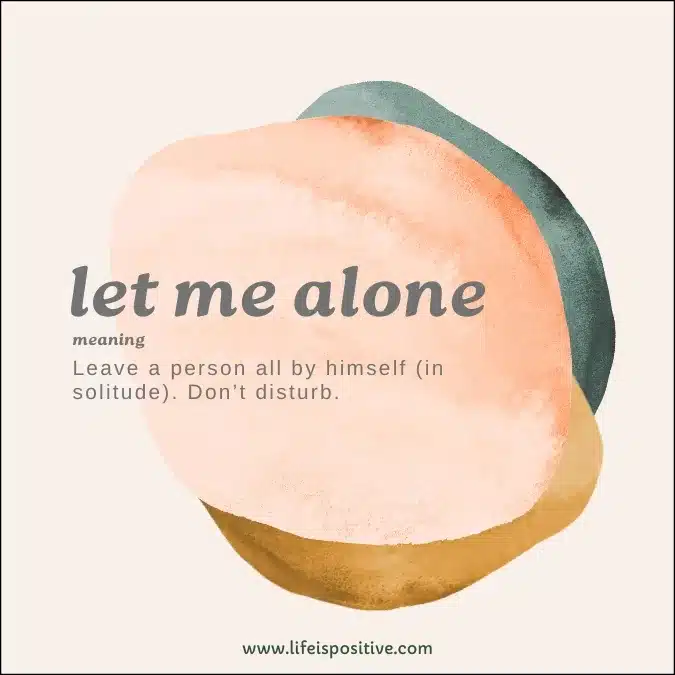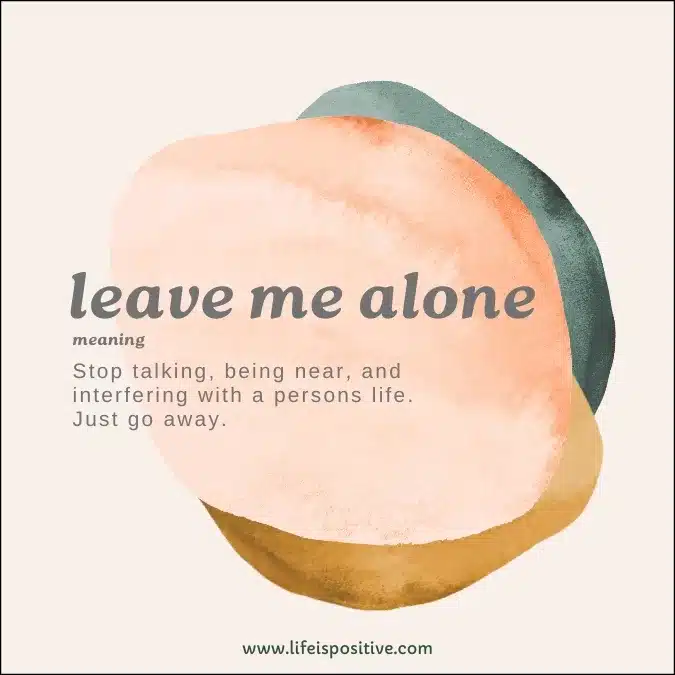|
Getting your Trinity Audio player ready...
|
In a world buzzing with constant communication and connectivity, the simple act of seeking solitude or setting boundaries can carry profound meaning.
Two phrases, “Let me alone” and “Leave me alone,” although seemingly similar, have subtle nuances that convey different emotions and intentions.
In this post, we embark on a journey to explore the depths of these expressions, shedding light on their significance and understanding how they can impact our relationships, mental well-being, and self-care.
Whether you’ve used these phrases yourself or wondered about their implications when someone else utters them, this exploration will shed light on their true meanings and the intricate dance between seeking understanding and asserting boundaries.
So, join us on this quest to decipher the language of “Let me alone” and “Leave me alone.”
By the end of this journey, you’ll have a deeper appreciation for the subtle yet powerful ways these phrases shape our relationships and the art of communication.
The Meaning Behind the Phrases
“Let Me Alone” – Seeking Understanding

The phrase “Let me alone” is an intriguing one.
On the surface, it might seem like a request for solitude, but it often carries a deeper message.
When someone says, “Let me alone,” they might be feeling overwhelmed or distressed and may be reaching out for understanding, comfort, or empathy.
It’s an invitation for someone to listen, support, and be there in a time of need.
“Leave Me Alone” – Asserting Boundaries

Conversely, “Leave me alone” is a clear boundary-setting statement.
It communicates a need for personal space and time away from interaction or external demands.
When someone says, “Leave me alone,” they are asserting their boundaries.
They clearly mean stop talking to me, stop being near me, stop interfering with my life, and go away.
It’s a statement that should be respected to maintain healthy relationships.
The Power of Boundaries
Defining Boundaries
Boundaries are the invisible lines that define the limits of what is acceptable and comfortable for each individual.
They are an essential part of healthy relationships, as they create a sense of safety, respect, and personal autonomy.
Setting boundaries allows us to protect our mental and emotional well-being while ensuring our needs are met.
Respecting Boundaries
Respecting others’ boundaries is just as crucial as setting our own. It requires active listening, empathy, and an understanding of different perspectives.
When we respect boundaries, we show that we value and care for the people in our lives. It fosters trust and open communication.
Boundaries in Different Contexts
Boundaries are applicable in various aspects of life, including personal, professional, and social settings. In personal relationships, they define the level of intimacy and the space needed for individual growth.
In the workplace, they help maintain a healthy work-life balance and set expectations for acceptable behavior. In social interactions, boundaries guide how we engage with others and ensure our comfort and safety.
The Importance of Effective Communication
1. Clear and Open Communication
Effective communication is the key to navigating the delicate balance between “Let me alone” and “Leave me alone.”
Expressing our needs and boundaries clearly and respectfully is vital for building strong, healthy relationships.
It prevents misunderstandings and conflicts and ensures that both parties feel heard and understood.
2. Active Listening
Listening is a fundamental aspect of effective communication.
When someone expresses their need for space with “Let me alone,” active listening can help us offer support and empathy.
On the other hand, when “Leave me alone” is communicated, respecting that request without judgment or offense is crucial.
3. Empathy and Understanding
Empathy is the ability to understand and share the feelings of another.
When someone says, “Let me alone,” responding with empathy and a willingness to connect can strengthen the relationship.
Conversely, when faced with a “Leave me alone” request, understanding that it’s a self-care measure is essential.
Balancing “Let Me Alone” and “Leave Me Alone”
1. Recognizing Emotional Needs
Understanding when someone needs emotional support versus personal space is essential. Pay attention to their words, tone, and body language to discern their emotional state and needs.
Sometimes, people may say one thing but mean another, so empathy and active listening are critical.
2. Mutual Respect
In any relationship, mutual respect for each other’s boundaries is paramount. It ensures that both parties feel valued and safe.
When someone says, “Let me alone,” offering support with respect for their boundaries strengthens the connection. Likewise, honoring a “Leave me alone” request is a sign of respecting personal space.
Effective Compromise
In some situations, finding a middle ground between “Let me alone” and “Leave me alone” may be necessary.
Effective compromise involves open communication, empathy, and a willingness to accommodate each other’s needs. It allows for flexibility while maintaining boundaries.
Final Thoughts
In the complex landscape of human relationships, understanding the nuances of expressions like “Let me alone” and “Leave me alone” is crucial.
These phrases convey distinct emotions and needs, from seeking understanding and connection to asserting boundaries.
Healthy relationships are built on clear, open communication, active listening, and empathy. Recognizing when to offer support and when to respect personal space is the key to maintaining balance and harmony in our interactions with others.
The key takeaway from this exploration is the importance of clear and empathetic communication.
Whether you use these phrases or hear them from others, remember that mutual respect and empathy are the cornerstones of healthy relationships. The art of balance is understanding when to offer support and honor personal space.
So, as we navigate the intricate web of human interactions, let’s carry with us the wisdom of “Let me alone” and “Leave me alone.”
These expressions remind us of the beautiful complexity of our emotional lives and the importance of respecting each other’s needs.
In doing so, we create spaces where understanding, empathy, and connection can flourish, nurturing stronger, more meaningful relationships.
For more empowering content, connect with our vibrant community here ➡️ Social Media.
